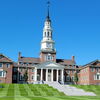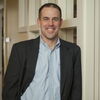Uneasy alliance | The state's only med school and its largest hospital are virtually neighbors. So why don't they collaborate more?
This summer, when it was revealed the University of New England College of Osteopathic Medicine in Biddeford was in talks with Maine Medical Center in Portland to partner on a new medical school program, the idea made perfect sense to many: Maine's only medical school teaming up with Maine's largest teaching hospital. What's more, those primary care doctors trained in Maine would be more likely to remain in Maine.
But that's not how a cadre of osteopathic physicians in the state viewed the news. Instead, the collaboration was mostly viewed with apprehension, with some outright panning of the plan.
That less-than-enthusiastic reaction to the plan is no surprise for those familiar with the turbulent history between the two medical institutions. UNECOM, established by the New England Foundation for Osteopathic Medicine in 1978, is an osteopathic medical school, meaning it teaches a holistic approach to medicine and awards a Doctor of Osteopathy (D.O.) degree, rather than a Doctor of Medicine (M.D.), to its graduates. Allopathic medicine is considered the more conventional form of medicine and is the basis for Maine Med's teaching program.
In Maine, the talk of a possible collaboration created a rumor mill that in June churned out stories about osteopathic medicine's tenuous position at UNE, which also offers an undergraduate liberal arts program. One rumor was that Maine Med planned to usurp control and make UNECOM an M.D. school. No evidence substantiated these rumors, but that didn't prevent a stream of panicked emails from flowing through Maine's osteopathic community.
In response to the rumors, nine concerned osteopathic physicians in early June created the Maine Osteopathic Communications Committee, whose mission is to monitor "the political activities of UNECOM," according to its website.
"We weren't totally certain where the school was going," says Adam Lauer, a UNECOM graduate who now practices family medicine in Brewer, and one of the founders of the committee. "We formed the committee to facilitate accurate information, rather than rumors, and allow a forum or both sides of the equation — D.O.s and the administration at the school — to disseminate information."
The opposition to anything that would threaten the school's osteopathic heritage was vehement. In a speech earlier this year to UNE's board of trustees, Owen Pickus, an instructor and trustee, called it a "civil war" and said the fact that UNE's administration, led by President Danielle Ripich, who arrived in the job in July 2006, would even entertain a partnership with Maine Med was like the "first firing on Fort Sumter."
"And the bloodshed to follow will leave no survivors," continues the speech, which is posted on the committee's website. "This is a finality that no one desires, but it is a nuclear option that will be triggered if the school veers toward any direction than an osteopathic direction."
UNE has since dropped from the negotiations to partner on the new medical school program. In fact, Maine Med in August said it is negotiating with three schools — the University of Vermont College of Medicine, Tufts University School of Medicine and Dartmouth Medical School — to partner on the new program. But while UNECOM-going-M.D. rumors may have quieted down, members of Maine's osteopathic community aren't letting their guard down. "As long as I'm breathing, the actual degree-bearing nature of the D.O. school won't change," says Pickus, who's been a trustee for nearly 20 years.
But Maine Med's plans still raise questions for some members of the osteopathic community. While UNECOM has tried to secure more slots for its third-year med students to do rotations at Maine Med, the hospital has said there's not enough room, according to Pickus. The majority of slots at the hospital are reserved for students from the University of Vermont College of Medicine, with which Maine Med has a 20-year teaching relationship, according to Vincent Conti, Maine Med's president and CEO.
But this new medical school program, which would include 20 spots reserved for Maine high school graduates, would train more students at the hospital. "So if they don't have room, how all of a sudden do they have 20 new spots for this new med school program?" Pickus says. "And if they could do this all along, why didn't they?"
Making room
Catherine Fredricks-Rehagen, a fourth-year medical student at UNECOM, says she was lucky to stay in Maine for the vast majority of her third-year rotations.
After spending the first two years on campus, all third-year UNECOM students are required to complete six-week, on-site rotations in pediatrics, family practice, psychiatry, and obstetrics and gynecology, as well as four weeks of rural medicine and 12 weeks of internal medicine. These rotations are done at hospitals from Maine to as far south as New Jersey and Pennsylvania.
While training sites in places like New Jersey and Pennsylvania may seem far from UNE's Biddeford campus, Jacquelyn Cawley, interim dean of UNECOM, says it's not so bad for most students. "Actually, it tends to be a positive for us as far as recruitment goes because we do get quite a few of our medical students from those states," she says. "So they get to be closer to their families during their core rotation months."
Besides her pediatrics rotation, which she completed at a hospital in New Jersey, Fredricks-Rehagen, who grew up in Leeds, was able to stay in Maine and close to her family. "If you want to stay in Maine, you absolutely can. That's not an issue," Fredricks-Rehagen says. "But there are never enough southern Maine slots."
Being the largest teaching hospital in the state, it would make sense for Maine Med, only 20 minutes from UNECOM's Biddeford campus, to be the major teaching hospital for Maine's only medical school, says Pickus.
But it's not. While Maine Med has 44 slots available for third-year med students, only five are reserved for UNECOM students, and those spots are only in ob-gyn, internal medicine, psychiatry and family medicine. And even those five reserved slots are fairly new, Pickus says. "That wasn't the case a few years ago," he says. "So I'm pleased to have anything."
Thirty-six of the remaining slots are reserved for third-year med students from the University of Vermont College of Medicine, according to Jenny Skolfield, assistant director of Maine Med's medical education department. Maine Med has been a primary teaching college for UVM's medical college since 1980, according to Maine Med CEO Conti.
What Pickus doesn't understand is why Maine Med wants to spend time and money developing a new medical school program to train more primary care doctors with the hope they stay in Maine. He says the hospital is not supporting the medical students already in Maine at UNECOM, which recently welcomed 124 new medical students to its campus, its largest class ever. Pickus adds that there are roughly 350 UNECOM graduates practicing medicine in Maine. "We can give them these students for free," Pickus quips. "All the students you want, no charge."
Conti, Maine Med's CEO, says the new medical school is a matter of developing a new curriculum that would focus on rural medicine, not just about bringing more med students to Maine. "If we were doing the same old, same old, [Pickus'] point would have some validity," he says. "But we're looking to do something different."
The D.O. debate
The frustration within the osteopathic community with Maine Med was born from more than just recent events. In 1994, Maine Med acquired Brighton Medical Center in Portland, which at the time was an osteopathic hospital. When that happened, UNECOM lost its teaching hospital. According to Pickus, at the time Maine Med made promises to help train osteopathic medical students from UNECOM. "That's where the animosity that exists comes from," Pickus says. "The paranoia of this concern for our school comes from the fact that promises were made and not kept when they took Brighton Medical Center."
That's why the initial talk of collaboration created such uproar. "When the only vestige of osteopathy in the state is talk.ing about doing anything with Maine Medical Center, it will certainly create massive fear in D.O.s that remember Brighton," UNECOM grad Lauer says.
Other events on campus earlier this year also contributed to the alarm. In May, Ripich asked the interim dean at UNECOM to resign and appointed Jacqueline Cawley as the new interim dean. As president of the medical staff at Maine Med, many thought Cawley, although a 1989 UNECOM graduate, was too close to the hospital for comfort. A letter posted on MOCC's website from William Bergen, an osteopathic physician in Presque Isle, to the Osteopathic Physicians of New England, suggests the hiring of Cawley was "a logical first step to the granting of an M.D. degree at the University of New England. Such a move can only lead to loss of osteopathic control over our medical school and to its becoming an allopathic school."
For her part, Cawley says she'll step down as president of Maine Med's medical staff Oct. 1, and says she's dedicated to preserving UNECOM as an osteopathic school. She chalks up the rumor mill to miscommunication. "Losing Brighton we lost a focal point for the osteopathic community," she says. "UNECOM has become that focal point."
While UNE's bylaws prevent it from abandoning its D.O. degree, nothing says it can't incorporate an M.D. degree, as well. But Pickus, who in 1974 graduated from the University of Michigan with a D.O. from the first class in the country of dual D.O./M.D. medical students, still thinks that's a bad idea. As a member of UNE's Board of Trustees, Pickus in early June introduced a resolution that would prevent UNE from incorporating an M.D. program. The 38-member board, which only includes seven osteopathic physicians, rejected the resolution. "I drew from that the fact they are not going to close the door," he says.
Whatever happens, watchdog groups like the Maine Osteopathic Communications Committee, the osteopathic community at large will be kept abreast of whatever goes on at the school. "What we don't want to do at this point is sit back and wait and watch," Lauer says. "Because to sit back and wait and watch is what lost us Brighton Medical Center."










Comments